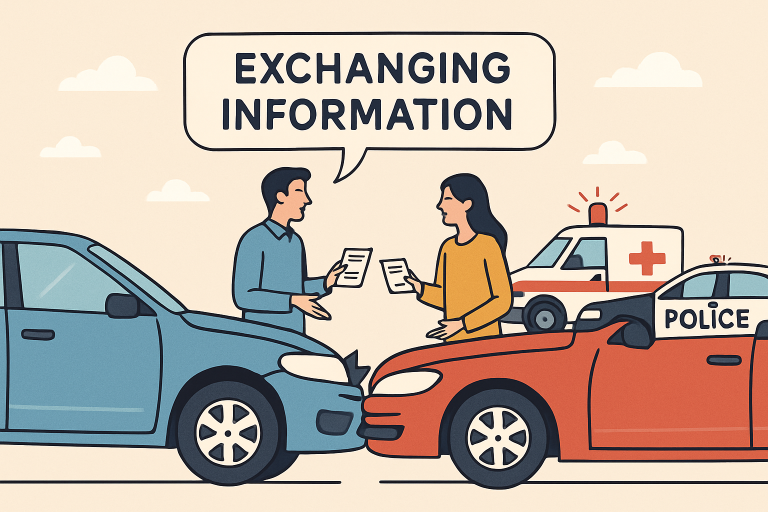Table of Contents
- Immediate Steps to Take
- What to Say at the Scene
- What Not to Say at the Scene
- Communicating with Insurance Companies
- Seeking Medical Attention
- Documenting the Accident
- Consulting Legal Professionals
- Conclusion
Car accidents can leave you rattled and unsure of how to protect yourself during the critical moments that follow a collision. Getting your communication right can make all the difference when dealing with other drivers, law enforcement, insurance companies, and health professionals. In these moments, knowing what to say — and what not to say — is crucial to protecting your interests and ensuring a smoother aftermath. If you need legal support, an auto accident attorney Dallas, TX can provide valuable guidance on how to proceed and handle discussions with insurance companies effectively.
Failing to choose your words carefully or providing too much information can not only complicate insurance claims but may also impact your ability to receive fair compensation. This guide covers step-by-step what you should — and shouldn’t — do after a car accident, including immediate steps, essential communication strategies, and professional resources to help navigate the process.
Immediate Steps to Take
After a collision, your safety and the safety of others must be your first priority. Move to a safe location if possible, and quickly assess whether anyone is injured. Call emergency services if medical attention is required. Exchanging accurate information comes next: be sure to obtain the other driver’s full name, contact information, insurance policy details, and vehicle identification. Try to calmly write down or capture with your phone the time, place, and any nearby landmarks. If witnesses are present, ask for their names and contact details, as witness statements can be critical in insurance claims or disputes.
Never leave the scene of the accident until it is appropriate to do so. Depending on your location, this could be after exchanging information or after law enforcement arrives and completes their assessment. Review the latest guidance from the National Highway Traffic Safety Administration (NHTSA) on managing traffic incidents for additional safety measures and documentation tips.
What to Say at the Scene
Stick strictly to the facts at the scene. Share only the necessary information when speaking to police, paramedics, other drivers, or witnesses. Avoid guessing what might have caused the crash or assigning blame. Answer questions from law enforcement honestly and succinctly — for example, “I was driving south on Main Street when the other car entered the intersection.” Avoid broad statements, and focus on observations rather than conclusions or assumptions.
What Not to Say at the Scene
Your words can be used against you in both insurance and legal proceedings. Avoid apologizing or saying things like “I’m sorry,” “I didn’t see you,” or “It’s my fault,” even if you feel pressured or sympathetic. These phrases can be interpreted as admissions of guilt and may complicate your ability to recover damages later, even when you are not legally at fault. Similarly, do not speculate about how the accident happened or comment on the condition of your vehicle or your injuries. It’s best not to discuss your physical state in too much detail at the accident site. Some injuries, such as whiplash, internal bruising, or concussions, may not present symptoms for hours or days. Telling anyone that you “feel fine” could hurt your chances of getting compensation if symptoms appear later, as noted by WebMD in their guide on whiplash symptoms and treatment.

Communicating with Insurance Companies
Soon after the collision, you’ll need to notify your insurance provider. When describing the accident, state the facts clearly and concisely, without offering theories or speculations about fault or the extent of injury. Insurance adjusters may try to prompt you into making admissions or accepting low settlement offers. Polite but limited answers are best. If you’re uncomfortable, you can inform the adjuster that you would like to consult with a legal professional before answering detailed questions.
Seeking Medical Attention
All accident victims should seek a medical evaluation, even when injuries seem minor or non-existent. A thorough check by a healthcare provider creates a medical record, which links any subsequent pain or injuries to the accident. This medical documentation will be critical for insurance claims and legal actions should symptoms worsen over time. Hidden injuries such as concussions, soft tissue damage, or internal bleeding are especially common and may require specific diagnostic tests.
Documenting the Accident
Preserve as much evidence as possible. Take photographs of the scene, road conditions, position of the vehicles, skid marks, debris, and visible injuries. Save physical evidence, such as damaged personal items, and collect copies of all paperwork: police reports, medical exams, repair estimates, and any communication with the insurance company. Maintaining a journal of your injuries, pain, or symptoms, along with their impact on your daily life, can also be helpful for insurance and legal purposes.
Consulting Legal Professionals
Legal professionals with experience in car accident cases can help clarify your rights, communicate effectively with insurance companies, and ensure you aren’t taken advantage of during negotiations. They can guide you on the best time and manner to provide statements, as well as represent you in the event of disputes or lawsuits. Consulting a legal expert is especially recommended when injuries are involved, liability is unclear, or if significant financial damages are at stake.
Conclusion
Effective communication after a car accident isn’t just helpful—it’s essential to protect yourself and recover fairly for damages and injuries. Be cautious and stick to the facts at the scene. Avoid admitting fault or speculation, document everything thoroughly, and consider enlisting professional legal support. These proactive steps empower you to navigate the challenging post-accident process and secure the best possible outcome.